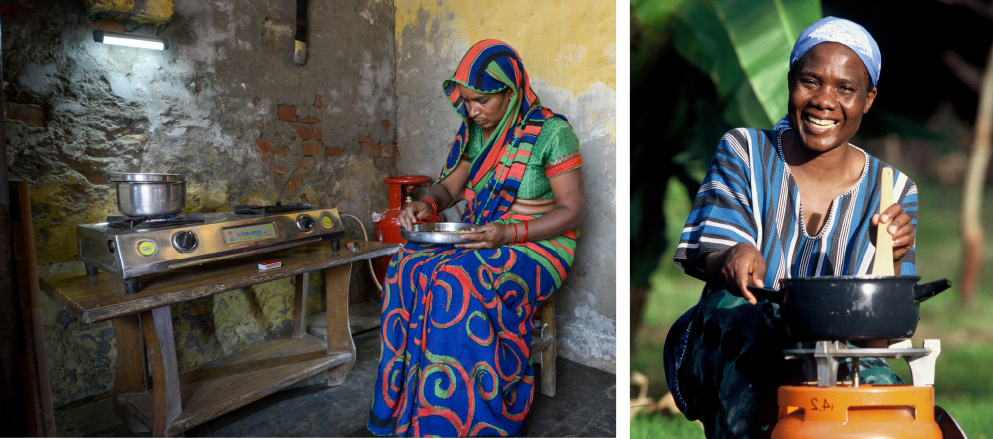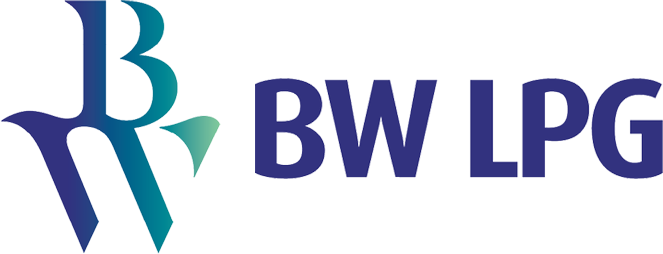SUSTAINABILITY
OUR PERFORMANCE
The table below shows a summary of our environmental performance data in 2019, and the following pages throw the spotlight on six focus areas ranging from our non-negotiable fundamentals, to our sustainability commitments.
OUR JOURNEY TOWARDS ZERO HARM
SPOTLIGHT
| FOCUS | UNSDG GOALS | GOAL MET? | 2019 PROGRESS | 2020 TARGETS |
|---|---|---|---|---|
To achieve Zero Harm to People, Environment, Cargo and Property with a commitment to return safely to our families and friends |
|
|
With safety at the top of our agenda, we strive for Zero Harm. As individuals and as teams, we commit to taking personal responsibility for safety, communicate safety concerns, and actively share best practices and learn from near-miss incidents. We have processes and tools in place to help ensure that every employee, both on shore and at sea, can operate in the safest work environment possible. Recognising that it is a journey, our HSSEQ team introduces initiatives regularly to enforce a strong safety culture in a growing family of seafarers and shore-based staff. The chart below shows our journey towards improving our safety performance, because every incident is one too many.
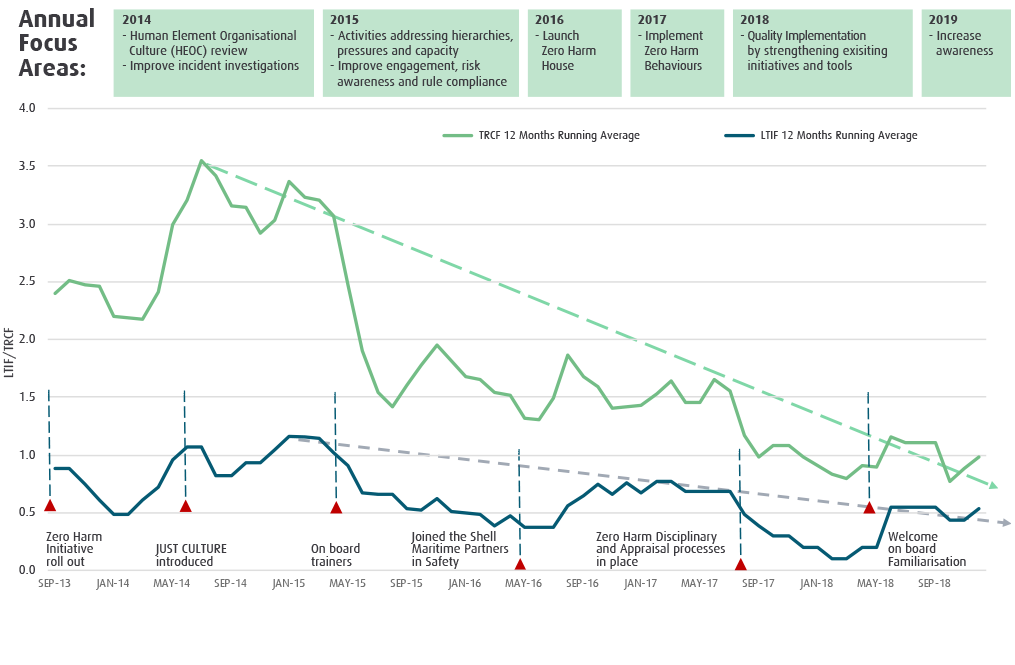
OUR JOURNEY TOWARDS ZERO HARM
In 2014, the HSSEQ team introduced the concept of Just Culture to the organisation and emphasised an environment of safe reporting and shared learning. The team improved incident investigation procedures and reviewed the role of human factors and organisational culture in incidents. In 2015 and 2016, the team worked on findings from the review with activities to improve engagement, risk awareness and compliance with policies and procedures. The team also worked to improve leadership skills on board and on shore. In 2017 and 2018, the focus swung to new appraisal and disciplinary processes, and the introduction of guidelines such as Zero Harm Behaviours and Life Saving Rules.
KEEPING THE PRESSURE UP – INCREASING AWARENESS
In 2019, continuing the focus on providing clearer guidelines and processes for on-site safety, a BW Hazards Wheel was introduced and mindfulness on the job was emphasised. As a carrier of clean energy, we are mindful that the nature of our workplace requires a higher level of care emphasising an awareness on hazards – both situational and cargo-related. New training courses were introduced, on-site supervision and hierarchy of controls were emphasised, and crews were reminded to focus on awareness and engagement - even in the small tasks - as well as the managing of hazardous materials. All crew, regardless of rank, can and must stop unsafe work activities without the fear of retaliation or embarrassment.
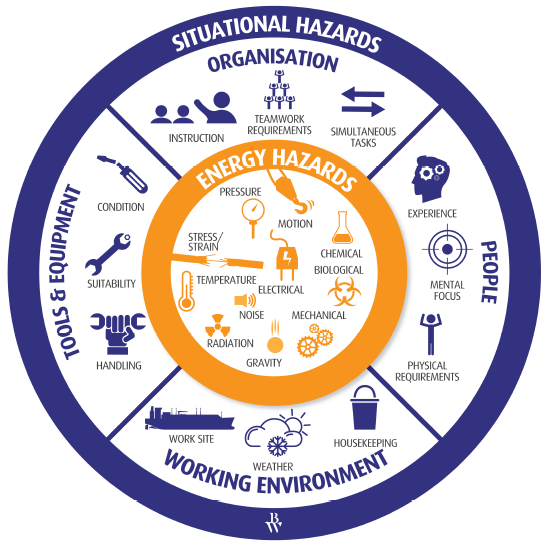
Above: Diagram 3 – BW Hazards Wheel
Safety is a continuing process - we do everything we can to prevent incidents from happening. When they do happen, unfortunately, we learn from it and we make improvements. In 2019, we are pleased to report that our fleet-wide 12-month rolling average Loss Time Injury Frequency (LTIF) was 0.25, which is well below our baseline of 0.50. As we focus on rolling out new initiatives, we remain committed to emergency response preparedness. In collaboration with external stakeholders such as our Qualified Individuals (QI), P&I Clubs and crisis communications agency, we conduct regular drills to stress-test our processes, train crew and colleagues, and refine our response as a team. In 2019, we conducted two drills with scenarios of allision (contact with a stationery vessel) and oil spill, and suspicious crafts (piracy).
DRIVING THE WORLD'S ENERGY TRANSITION
SPOTLIGHT
| FOCUS | UNSDG GOALS | GOAL MET? | 2019 PROGRESS | 2020 TARGETS |
|---|---|---|---|---|
To reduce our environmental impact and comply with global emissions regulations |
|
|
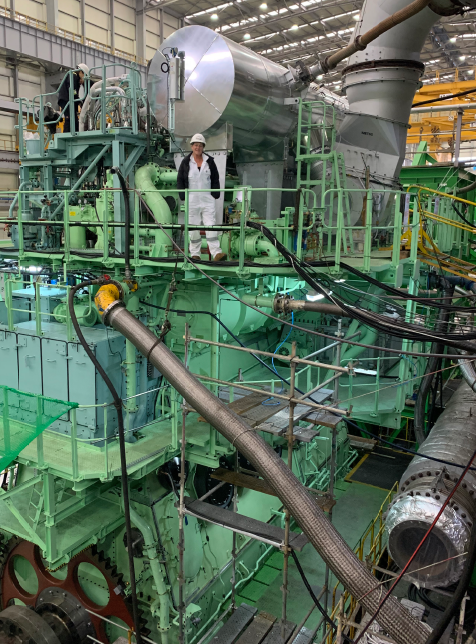
BW LPG Fleet Supervision Manager inspecting the LPG dual-fuel parent engine during final testing
Shipping transports over 90% of the world’s trade and is the foundation for the global movement of goods. As a facilitator of modern life, shipping is inextricably linked to the concern of climate change and the need for more sustainable behaviours. Yet, shipping is the most carbon efficient way of moving goods and connecting countries. A large vessel produces less than 20 grams of CO2 per ton-km, whereas a truck produces two and a half times as much (about 50 grams per ton-km) and a plane produces almost 30 times as much (about 550 grams). Still, because of humanity’s dependency on ocean transportation, the shipping industry remains a significant contributor to global emissions.
The main type of fuel oil for ships is heavy fuel oil (HFO), derived as a residue from crude oil distillation. Crude oil contains sulphur which, following combustion in the engine, ends up in ship emissions. Sulphur oxides (SOx) are known to be harmful to human health, and in the atmosphere, SOx is environmentally detrimental. IMO regulations to reduce SOx emissions from ships first came into force in 2005, under the IMO’s Annex VI of the International Convention for the Prevention of Pollution from Ships (known as the MARPOL Convention). The limits on SOx have been progressively tightened since, and from 1 January 2020, the limit for sulphur in fuel oil used on board ships operating outside designated emission control areas was reduced to 0.5% m/m (mass by mass).
BW LPG had planned for IMO 2020 for years and had multiple contingency plans in place to ensure it was business-as-usual on 1 January 2020. Our multipronged strategy to manage fuel supply and price risk includes using compliant fuels for our owned and operated fleet by working closely with oil majors to secure adequate supplies of compliant fuels; financial hedging for spreads between MGO and HFO to mitigate our exposure to uncertainties in compliant fuel prices; and installing scrubbers on six vessels to mitigate fuel supply concerns.
Over and above the securing of fuel supply and adopting the use of currently available technical solutions, BW LPG is of the view that the maritime industry needs to invest in new technology to cut emissions and decarbonise. We have taken the lead by being the world’s first to retrofit LPG fuel ships that will significantly cut emissions and contribute towards decarbonising the industry. LPG is readily available, and the technology can be reproduced on other vessel types. With LPG propulsion, BW LPG will reduce its SOx emissions by up to 97%, emissions of particulate matter (PM) by over 90%, greenhouse gases (GHG) by over 25%, and nitrogen oxides (NOx) by over 20%. This goes beyond IMO’s global 0.5% sulphur emissions cap and also ensures full compliance with the IMO’s Emission Control Areas (ECAs) and Sulphur Emission Control Areas’ (SECAs) 0.1% sulphur cap.
ENSURING WELLNESS@SEA
SPOTLIGHT
| FOCUS | UNSDG GOALS | GOAL MET? | 2019 PROGRESS | 2020 TARGETS |
|---|---|---|---|---|
To continuously improve the physical and mental health of our seafarers |
|
|
The health and safety of our crew remains a fundamental commitment for BW LPG. From the standards and framework perspective, BW LPG adheres to the International Safety Management (ISM) Document of Compliance from Bahamas, Bermuda, Isle of Man, Malta, Norway and Singapore Flags. We also comply with the ISO 14001:2015 Management System Certificate, ensuring that our vessels follow an established Environmental Management System standard. We hold an ISO 9001:2015 Management System certificate for our shore-based operation and technical management of gas carriers, including crewing and procurement. We are proud to offer our crew competitive salaries and benefits, including insurance coverage, shore leave, and prompt sign-offs. We follow Maritime Labour Convention’s (MLC) work hours for good work-life balance1 on board, introduced new policies to deter bullying and harassment, and continue to work in partnership and collaboration with all relevant unions and regulatory bodies2 for the benefit and protection of our crew. We fully support our crew and employees’ rights to Freedom of Association and Human Rights (rights inherent to all human beings, regardless of race, sex, nationality, ethnicity, language, religion, or any other status).
At the very core of every vessel’s smooth sailing is her crew. Healthy seafarers are more alert and can work more efficiently and safely. The BW Wellness Programme was conceptualised under the Zero Harm umbrella as we strongly believe that the well-being of our seafarers impacts safety.
The BW Wellness Programme works on an internet and mobile enabled platform, harnessing the power of technology to allow crew to focus easily on areas of interest such as fitness, nutrition, wellness and education. Health data such as age, weight and blood pressure are keyed into the platform, which provides every individual with opportunities for improvement. For example, participants may be offered meal plans to improve nutrition, reminded to exercise to burn off excess calories, asked to plan a game of basketball to bond with fellow colleagues, and even encouraged to try mindfulness exercises to improve mental health.
Launched as a pilot programme in 2017, it was much appreciated by the seafarers and was fully rolled out to all vessels in 2019. The philosophy behind the BW Wellness Programme is to create a cultural change across the organisation that holistically supports the well-being of seafarers on a continual basis, instead of focusing on single events. Holistic well-being means being well physically (where your body is cared for to achieve optimum performance), mentally (educating oneself and challenging the mind to learn more), and socially (to connect well with others). The programme celebrates small wins, which can be accomplished with reasonable effort and allow positive feelings of success to power a virtuous cycle of being well at sea.
In 2019, we rolled out emotional helplines and mental health posters across the fleet. We also improved shore competency at assisting crew who reach out to us for mental health-related matters.
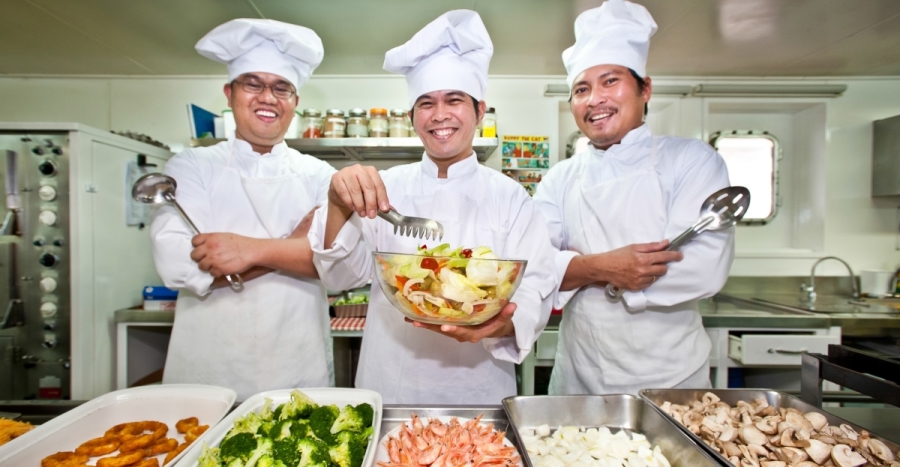
1 International Labour Organization’s Maritime Labour Convention (MLC) states that ship working hours should be: Eight hours a day, under normal circumstances, with one day as a rest day. A maximum of 14 hours in any 24-hour period. A maximum of 72 hours in any seven-day period.
2 Unions and regulatory bodies we work with include the Philippine Overseas Employment Administration (POEA), Overseas Workers Welfare Administration (OWWA), India’s Directorate General of Shipping (DGS), the Maritime Floating Staff Welfare Trust and the Seafarers Welfare Fund Society.
SERVING SOCIETY THROUGH ENERGY DELIVERY
SPOTLIGHT
| FOCUS | UNSDG GOALS | GOAL MET? | 2019 PROGRESS | 2020 TARGETS |
|---|---|---|---|---|
To protect our crew and assets from risks in troubled times and waters, and ensure the continued flow of clean energy globally |
|
|
BW LPG has measures in place to deter attacks and safeguard the well-being of all on board. BW LPG’s fleet security team follows a set of rigorous operational procedures, relies on several intelligence resources to evaluate the risk of sea routes, and provides guidance on the most strategic route of travel. For example, vessels transiting high-security areas follow a set of regularly updated guidelines which respect various reporting requirements as defined by the UK Maritime Trade Operations (UKMTO), the Maritime Security Centre - Horn of Africa (MSC-HOA), various national authorities, flag states and charterers. Anti-piracy gear, such as razor wire and water hoses, are fitted on board vessels to deter hostile boarding.
BW LPG has a robust system in place to assess piracy risks in High Risk Areas (HRAs) including the Strait of Hormuz and the Gulf of Guinea so that we can deliver energy safely and reliably for our customers and the communities we serve. Vessels take extreme caution, such as transiting the area at maximum safe speed during the hours of daylight, keeping away from the troubled coastlines, posting extra lookouts, monitoring the Very High Frequency (VHF) radio closely to follow all instructions from coalition forces, treating unidentified vessels and small craft with caution and adhering to Best Management Practices (BMP). In total, BW LPG made 24 transits through the Strait of Hormuz in 2019 with the assistance of the UK Royal Navy at a time of heightened tension in the straits. We wish to extend our appreciation for their professional assistance, and for supporting the continued and vital flow of energy even during troubled times, to communities around the world.
BW LPG’s VLGC BW Elm was the first UK-flagged gas carrier to pass through the Strait of Hormuz after Iran’s seizure of the Stena Impero. BW LPG followed developments in the Strait of Hormuz closely and all vessels are to proceed with additional vigilance and to follow appropriate security protocols in place. We also liaised closely with all the relevant authorities such as flag, class, and insurers and operated at its highest security protocol.
In 2019, BW LPG is pleased to report that there were neither any incidents of piracy nor security incidents on board any of our vessels. Individual companies such as BW LPG cannot solve the problem to end piracy ourselves, but we take our responsibility to train and protect our crew, vessels and cargoes very seriously. The IMO has taken a leadership role in coordinating efforts to alleviate the problem from the maritime perspective.
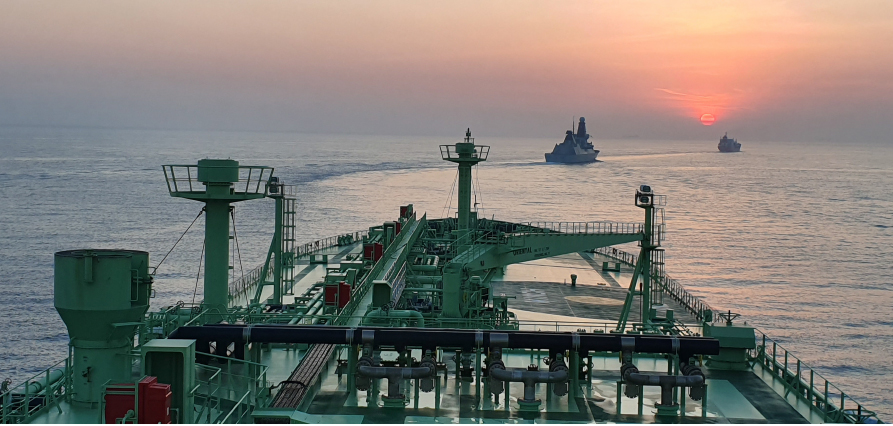
DO NOT ASK; WE WILL NOT PAY
SPOTLIGHT
| FOCUS | UNSDG GOALS | GOAL MET? | 2019 PROGRESS | 2020 TARGETS |
|---|---|---|---|---|
BW LPG stands united in the global stand against bribery and corruption in the maritime industry |
|
|
BW LPG has an Anti-Bribery and Anti-Corruption Policy that applies to all employees on shore and on board. The aim of the policy is to achieve best practice with respect to prevention of bribery and corruption and in particular to follow the principles set out in the well-known and commonly followed UK Bribery Act 2010.
We value our Company's reputation for ethical behavior and fair dealing with suppliers, customers, competitors and employees. All employees are expected to conduct themselves with the highest standard of integrity. In this regard, we provide training and guidance to employees, as well as require staff to report all gifts and entertainment received. Further, we will also support any employee who uses our Whistleblowing Policy to report any instances of bribery or corruption. BW LPG thanks all seafarers for their support and compliance with our "Do Not Ask; We Will Not Pay" initiative, and we stand united to play our part in ending bribery and corrupt practices in the maritime industry.
We commemorated with United Nation’s International Anti-Corruption Day on 9 December with an announcement from the CEO of BW LPG to all shore staff, calling for continued vigilance against corruption and bribery. All vessels received a letter from the Executive Vice President, Technical and Operations to remind crew of the need to stand united and eradicate practices such as facilitation payments. Messages of support were posted on the Company’s social media platforms.
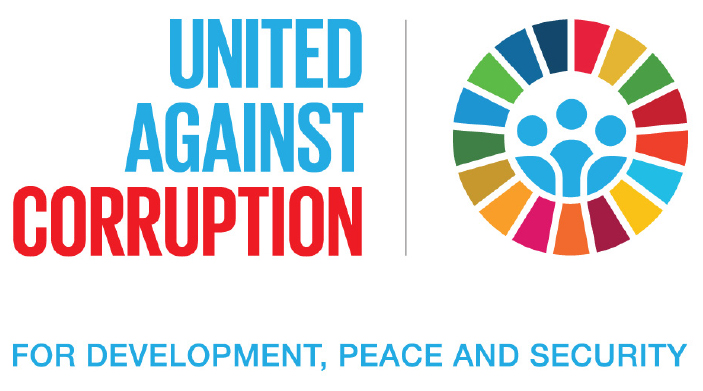
IMPROVING LIVES THROUGH LPG
SPOTLIGHT
| FOCUS | UNSDG GOALS | GOAL MET? | 2019 PROGRESS | 2020 TARGETS |
|---|---|---|---|---|
To partner with governments through WLPGA to bring LPG to communities which still rely on traditional fuels for cooking |
|
|
|
In the context of development goals of the global community, the World LPG Association (WLPGA) launched the Cooking For Life campaign in 2012, with the aim to transition one billion people from cooking with traditional and other dirty and dangerous fuels to cleaner-burning LPG by 2030. By convening governments, public health officials, the energy industry and global NGOs, this campaign explores practical ways of expanding access to LPG in the developing world to improve the lives of billions of people whose health and safety are threatened by cooking with solid fuels. Cooking For Life focuses on communicating the benefits of switching populations from cooking with biomass and other dirty and dangerous fuels, to cooking with LPG. Ranging from key studies and reports to marketing initiatives, workshops and participation in public events, the WLPGA has provided good industry practices and policy tools to grow the industry in a safe and sustainable manner.
Switching to LPG would improve quality of lives and bring far-reaching environmental and economic benefits. LPG produces virtually no particulate matter and low emissions of carbon monoxide compared to most non-renewable fuels. Emissions of toxic gases that can cause serious health problems if breathed in are negligible, making LPG highly suitable as a household cooking fuel. The economic benefits include the reduction in health-related expenditure and productivity gains that result from less illness and longer life, as well as the time saved in collecting traditional fuels. The total economic benefits of half of all the people using solid fuels worldwide are estimated at around US$90 billion per year compared with net intervention costs of US$13 billion.
As the leading maritime carrier of LPG and living up to our aim to deliver clean energy for a sustainable world, BW LPG supports the WLPGA Cooking For Life Campaign. Since our inaugural participation in 2016, a team of shore employees has participated in the Standard Chartered Singapore Marathon every year. Not only does this inspire a healthy lifestyle amongst employees, we are also dedicated to donating to the campaign for each employee taking part in the 10km, half marathon and full marathon races.
